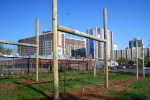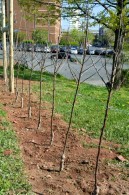
New Brunswick’s first orchard, which came from ideas of a fall 2011 graduate studio class, is at the intersection of Oliver and Abeel Streets.
On April 25, students from the Fall 2011 Voorhees Fellows/Community Development Studio class, as well as students in subsequent studios, saw their ideas become reality. Community and university partners planted nearly 40 apple trees downtown near Elijah’s Promise, creating the city’s first urban orchard.
The Fall 2011 Community Development Studio and Ralph W. Voorhees Civic Engagement Fellows worked with Elijah’s Promise to explore the potential to grow and process food in New Brunswick, estimate the purchasing power for fresh produce grown in the city, and identify growing and processing models that meet community economic development goals, like job training, education, and entrepreneurial business development, as well as food security goals such as increasing community access to healthy food.
The studio mapped where in the city food is grown and sought additional locations that had the potential to grow food. The students also reviewed the different ways to grow in the city, the types of products that would grow best, and the challenges and benefits of each model. Lisanne Finston, Director of Elijah’s Promise, asked the studio to consider the potential for an urban orchard. Katie Nosker, a Voorhees Fellow and studio participant, explored that vision and recently helped plant the orchard. As she explained: “So many wonderful people, organizations, and stakeholders came together to make this vision a reality. That I had even a small role in this great undertaking is incredibly rewarding. Planning for and planting this urban orchard, which will bring good, healthy, locally grown food to New Brunswick residents, has been a great learning experience. I look forward to watching this orchard grow.”
Orchard implementation moved forward after Elijah’s Promise’s Lisanne Finston shared the idea with School of Environmental and Biological Sciences (SEBS) dean Mark Robson on a Rutgers Community-University Research Partnership Grant-funded urban agriculture and community economic development field trip to Philadelphia. NJ Agricultural Extension Staff, New Brunswick residents, Elijah’s Promise’s staff, SEBS faculty, and Rutgers current and former students came together to plant the orchard.

